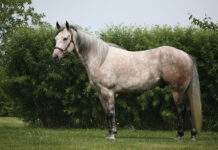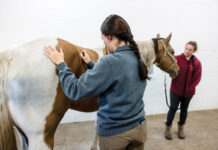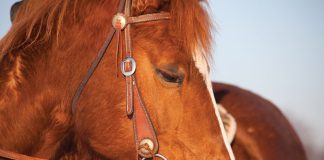Planes, trains and automobiles – the ability to move horses across the country, and even around the world, has come a long way. Although equine transportation is readily accessible in many forms, it is not natural for horses, and therefore, we need to provide extra support to keep them safe and healthy on the road. Here are some tips for keeping your traveling horse on the competition trail:

1) Biosecurity: Showgrounds and race tracks can be incubators for viruses and bacteria due to the high volume of horses that come in and out of them. You can help protect your horses by taking a few simple measures to help minimize contact with these viruses and bacteria:
a. Disinfect any stall prior to using it. Mild antibacterial soap and warm water will kill most harmful viruses and bacteria that can affect your horse. Be sure to clean the walls, doors, bars and floors – anywhere his nose and mouth can touch.
b. Avoid nose-to-nose contact with other horses. Diseases such as Equine Influenza Virus and Equine Herpesvirus are transmitted from nose-to-nose contact and aerosolized, moist secretions.
c. Do not share equipment with horses from other farms without properly disinfecting it first. This could include bits, brushes, buckets, hoses, etc.
d. Have your horse properly vaccinated by a veterinarian at least two weeks prior to the start of your show season. One vaccine that should be considered for all horses at higher risk for equine influenza, including horses that travel, is Flu Avert® I.N. This modified-live intranasal vaccine is the only influenza vaccine that requires only one dose for primary immunization and has proven through numerous challenge studies to provide superior protection against current circulating field strains of influenza infecting the U.S. horse population1. There also is evidence supporting the use of Flu Avert I.N. to help reduce occurrence, severity and duration of disease in an influenza outbreak situation should your horse be exposed2.
2) Provide adequate ventilation during transport. In addition to being exposed to respiratory diseases through contact with horses from other farms, you can also put your traveling horse at risk by not allowing for proper ventilation while you are trailering or using new stalls. By allowing for adequate airflow, you can reduce your horse’s exposure to dust and ammonia, which can irritate his lungs and create what some call, “shipping fever.” You should also let your horse out of the trailer, breathe fresh air and move naturally every 3 to 5 hours during a long trip. This also can help protect respiratory health, as well as physical and mental health.
3) Consistency is key. Try to recreate your horse’s home environment as much as possible while on the road. When possible, feed and exercise your horse at the same time you would if you were home. Never change your horse’s feed (hay or grain) while you are away from home – ex: Don’t buy hay that is for sale at the show grounds unless you absolutely have to. Your horse is already at greater risk for digestive upset due to a change in environment, and changing feed will only increase this risk. If possible, it also is a good idea to bring water from your farm to help encourage them to stay hydrated. If you will be away for a long period of time, you can mix your water from home with water from the show grounds to ease your horse into the new taste.
4) Use medications only when necessary (and not prohibited by the show) and always under veterinary supervision. If you think your performance horse may benefit from a medication, supplement, alternative therapy, etc., don’t be afraid to ask your veterinarian for his/her counsel. Your veterinarian will be your best resource to ensure proper use and administration of any medication used for your horse’s health and welfare.
5) Allow your horse to rest as much as possible. Hauling, stalling, training and competing can really take a toll on your equine athlete. A couple days of turnout and rest after a show can be one of the best health remedies for your horse, both mentally and physically.
For more educational information and record-keeping tools that can keep your performance horse on track, talk with your veterinarian about the new Horse Care for Life™ program. To get a sneak peek, visit HorseCareforLife.com.
1. UC Davis (Nicola Pusterla) & Merck Animal Health. Infectious Upper Respiratory Surveillance Program. Ongoing Research 2008 – present.
2. American Association of Equine Practitioners Vaccination Guidelines (AAEP.org)







I don’t think you should have those windows down,its dangerous. The windows up with the bars is way safer. Horses have been known to try to get out those windows.
The windows are down when parked, up when rolling.